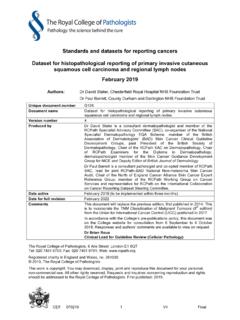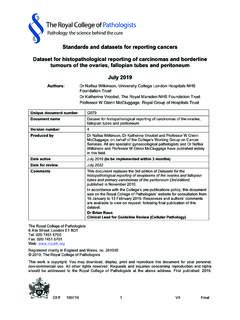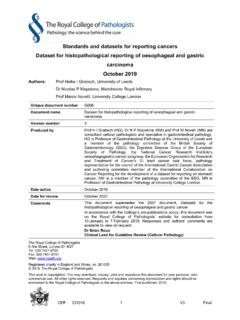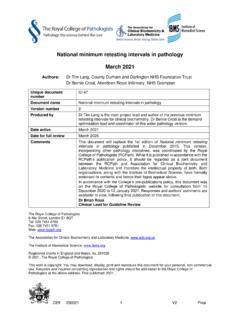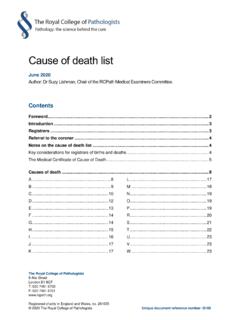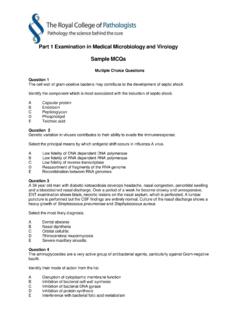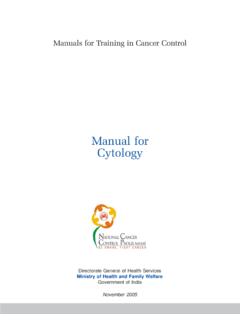Transcription of Standards and datasets for reporting cancers - RCPath
1 CEff 100214 1 V16 Final Standards and datasets for reporting cancers Dataset for thyroid cancer histopathology reports February 2014 Authors: Professor Timothy J Stephenson, Sheffield Teaching Hospitals NHS Foundation Trust Dr Sarah J Johnson, Royal Victoria Infirmary, Newcastle upon Tyne Unique document number G098 Document name Dataset for thyroid cancer histopathology reports Version number 3 Produced by Professor Timothy J Stephenson and Dr Sarah J Johnson. Both authors are consultant histopathologists with a special interest in thyroid pathology, and between them have experience in guideline development, postgraduate teaching, provision of expert opinions, case review for national clinical trials, professional leadership through holding office in relevant professional societies, and the external representation of thyroid pathology with the appropriate physician and surgeon organisations and with national sponsors of research and cancer data collection.
2 Date active February 2014 Date for review February 2015 Comments In accordance with the College s pre-publications policy, this document was on The Royal College of Pathologists website for consultation from 13 November to 11 December 2013. Forty-two items of feedback were received and the authors considered them and amended the document as appropriate. Please email if you wish to see the responses and comments. This dataset supersedes the 2010 publication of the same name. Dr Suzy Lishman Vice-President for Advocacy and Communications The Royal College of Pathologists 2 Carlton House Terrace, London, SW1Y 5AF Tel: 020 7451 6700 Web: Registered charity in England and Wales, no. 261035 2014, The Royal College of Pathologists This work is copyright.
3 You may download, display, print and reproduce this document for your personal, non-commercial use. Apart from any use as permitted under the Copyright Act 1968 or as set out above, all other rights are reserved. Requests and inquiries concerning reproduction and rights should be addressed to The Royal College of Pathologists at the above address. First published: 2014 CEff 100214 2 V16 Final Contents Foreword .. 3 1 Introduction .. 4 2 Clinical information required on the specimen request form .. 6 3 Preparation of specimens before dissection .. 6 4 specimen handling and block selection .. 6 5 Core data items .. 8 6 Non-core data items .. 17 7 Diagnostic coding and staging .. 18 8 thyroid cytology and reporting of small biopsy specimens.
4 18 9 reporting of frozen sections .. 18 10 Criteria for audit of the dataset .. 19 11 Acknowledgements .. 19 References .. 19 A TNM classification of malignant tumours (7th edition, 2009) .. 26 B SNOMED codes .. 28 C Histopathology reporting proforma for thyroid cancer .. 30 D Summary table Explanation of levels of evidence .. 32 E AGREE compliance monitoring sheet .. 33 NICE has accredited the process used by The Royal College of Pathologists to produce its Cancer datasets and Tissue Pathways guidance. Accreditation is valid for 5 years from July 2012. More information on accreditation can be viewed at For full details on our accreditation visit: CEff 100214 3 V16 Final Foreword The cancer datasets published by The Royal College of Pathologists ( RCPath ) are a combination of textual guidance, educational information and reporting proformas.
5 The datasets enable pathologists to grade and stage cancers in an accurate, consistent manner in compliance with international Standards and provide prognostic information, thereby allowing clinicians to provide a high standard of care for patients and appropriate management for specific clinical circumstances. It may rarely be necessary or even desirable to depart from the guidelines in the interests of specific patients and special circumstances. The clinical risk of departing from the guidelines should be assessed by the relevant multidisciplinary team (MDT); just as adherence to the guidelines may not constitute defence against a claim of negligence, so deviation from them should not necessarily be deemed negligent.
6 Each dataset specifies either all the core data items that are mandated for inclusion in the Cancer Outcomes and Services Dataset (COSD previously the National Cancer Data Set) in England, or, where the COSD has not yet covered the cancer site, specifies those items which are recommended for inclusion. Core data items are items that are supported by robust published evidence and are required for cancer staging, optimal patient management and prognosis. Core data items meet the requirements of professional Standards (as defined by the Information Standards Board for Health and Social Care [ISB]). The RCPath recommend as a key performance indicator1 that at least 95% of reports on cancer resections should conform to the cancer dataset.
7 Other, non-core, data items are described. These may be included to provide a comprehensive report or to meet local clinical or research requirements. All data items should be clearly defined to allow the unambiguous recording of data. The following stakeholder organisations have been consulted during the preparation of the dataset: British thyroid Association ( ), to standardise data items between this document and BTA/Royal College of Physicians thyroid Cancer Guidelines (3rd edition) British Association of Endocrine and thyroid Surgeons ( ) British Association of Head and Neck Oncologists ( ) UK Endocrine Pathology Society ( ) UK Association of Cancer Registries (UKACR) National Cancer Intelligence Network (NCIN) thyroid Clinical Reference Group.
8 Supporting evidence and recommendations in this dataset are based on: PubMed literature searches (up to July 2013) WHO classification, 20042 NICE Improving Outcomes Guidance, 20023 TNM 7th edition staging classification, The supporting evidence is level B to D or meets the GPP (Good practice point) criteria. No major conflicts in the evidence have been identified and any minor discrepancies between evidence have been resolved by expert consensus. No major organisational changes have been identified that would hinder the implementation of the dataset and there are no new major financial or work implications arising from the implementation, compared with the 2010 dataset. However, there are national initiatives to implement structured pathology reporting with the data items within cancer datasets becoming searchable fields within a relational data base,1 covering most cancers and not just thyroid cancer, which will have resource implications.
9 CEff 100214 4 V16 Final A formal revision cycle for all cancer datasets takes place on a three-yearly basis. However, each year, the College will ask the authors of the dataset, in conjunction with the relevant subspecialty adviser to the College, to consider whether or not the dataset needs to be revised. A full consultation process will be undertaken if major revisions are required, revisions to core data items (the only exception being changes to international tumour grading and staging schemes that have been approved by the Specialty Advisory Committee on Cellular Pathology and affiliated professional bodies; these changes will be implemented without further consultation).
10 If minor revisions or changes to non-core data items are required, an abridged consultation process will be undertaken, whereby a short note of the proposed changes will be placed on the College website for two weeks for members attention. If members do not object to the changes, the short notice of change will be incorporated into the dataset and the full revised version (incorporating the changes) will replace the existing version on the College website. The dataset was reviewed by the Working Group on Cancer Services and was placed on the College website for consultation with the membership from 13 November to 11 December 2013. All comments received from the Working Group and the membership were addressed by the authors to the satisfaction of the Chair of the Working Group and the Vice-President for Advocacy and Communications.
